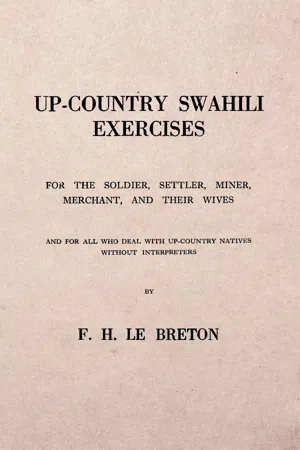
Up-Country Swahili - For the Soldier, Settler, Miner, Merchant, and Their Wives - And for all who Deal with Up-Country Natives Without Interpreters
- 100 pages
- English
- ePUB (mobile friendly)
- Available on iOS & Android
Up-Country Swahili - For the Soldier, Settler, Miner, Merchant, and Their Wives - And for all who Deal with Up-Country Natives Without Interpreters
About This Book
"Up-Country Swahili Exercises" is a guide to learning Swahili complete with exercises. Swahili, also known as Kiswahili, is a Bantu language and the first language of the Swahili people. It is a lingua franca of the African Great Lakes region and other parts of Southeast Africa, including Tanzania, Kenya, Rwanda, Uganda, Burundi, Mozambique and the Democratic Republic of the Congo. This volume concentrates on rural dialects and the more commonly-spoken language rather than "Correct Swahili", and it will be of considerable utility to those wishing to learn it. Contents include: "Adjectives", "Adverbs", "Comparison of Adjectives", "Conjunctions", "Demonstrations", "English-Derived Words". "Interrogative", "Locative Case", "Measure", "Money", "Na", "Nouns", "Numerals", "Personal Prefixes", "Pronunciation", "Solutions to Exercises", etc. Many vintage books such as this are becoming increasingly scarce and expensive. We are republishing this book now in an affordable, modern, high-quality edition complete with the original text and artwork.
Frequently asked questions
Information
UP-COUNTRY SWAHILI.

PRONUNCIATION
Jambo | How d’you do! |
Kwa | For. To. By |
Salamu | Greetings! (when writing) |
Kwa heri | Goodbye! |
Ndio1 | Yes. It is so |
Hapa | Here. |
Habari | News |
Mzuri2 | Good. Excellent |
Bwana | Sir. Master. European man |
Memsaab | Madam. European lady |
Sumile | Make way! |
Hapana (Siyo) | No |
Gani2 | What sort of? Which? |
Tu2 | Just. Only |
Table of contents
- Cover
- Title
- Copyright
- Preface
- Introduction
- Contents
- Pronunciation
- Swahili-English Vocabulary